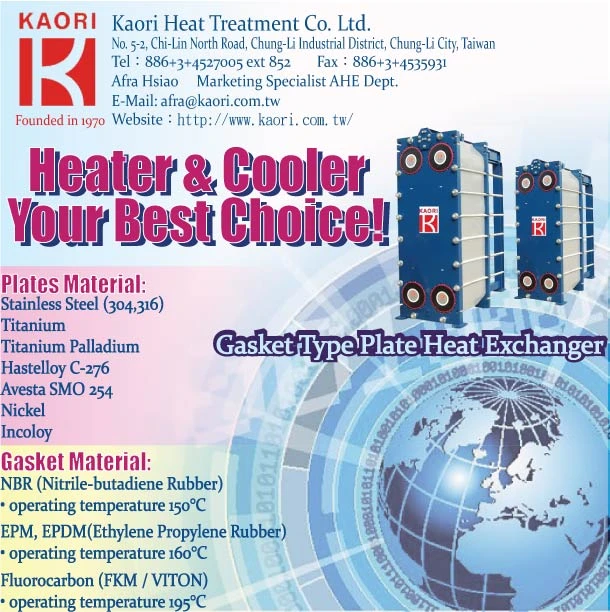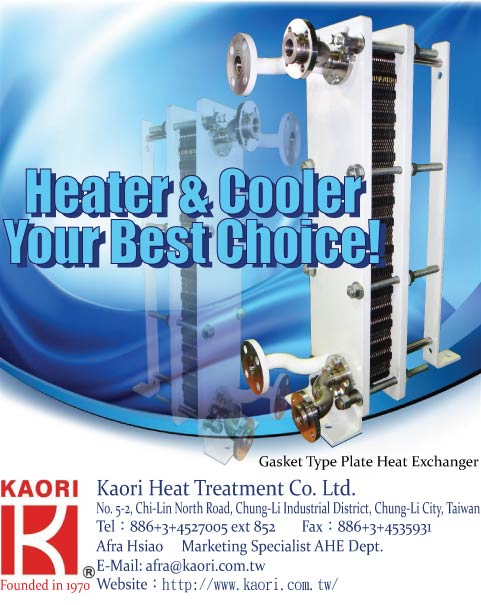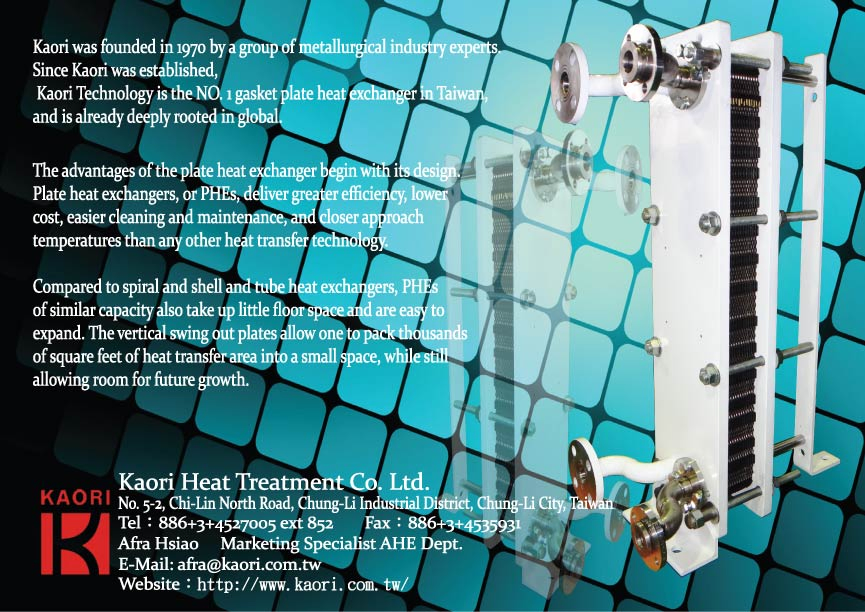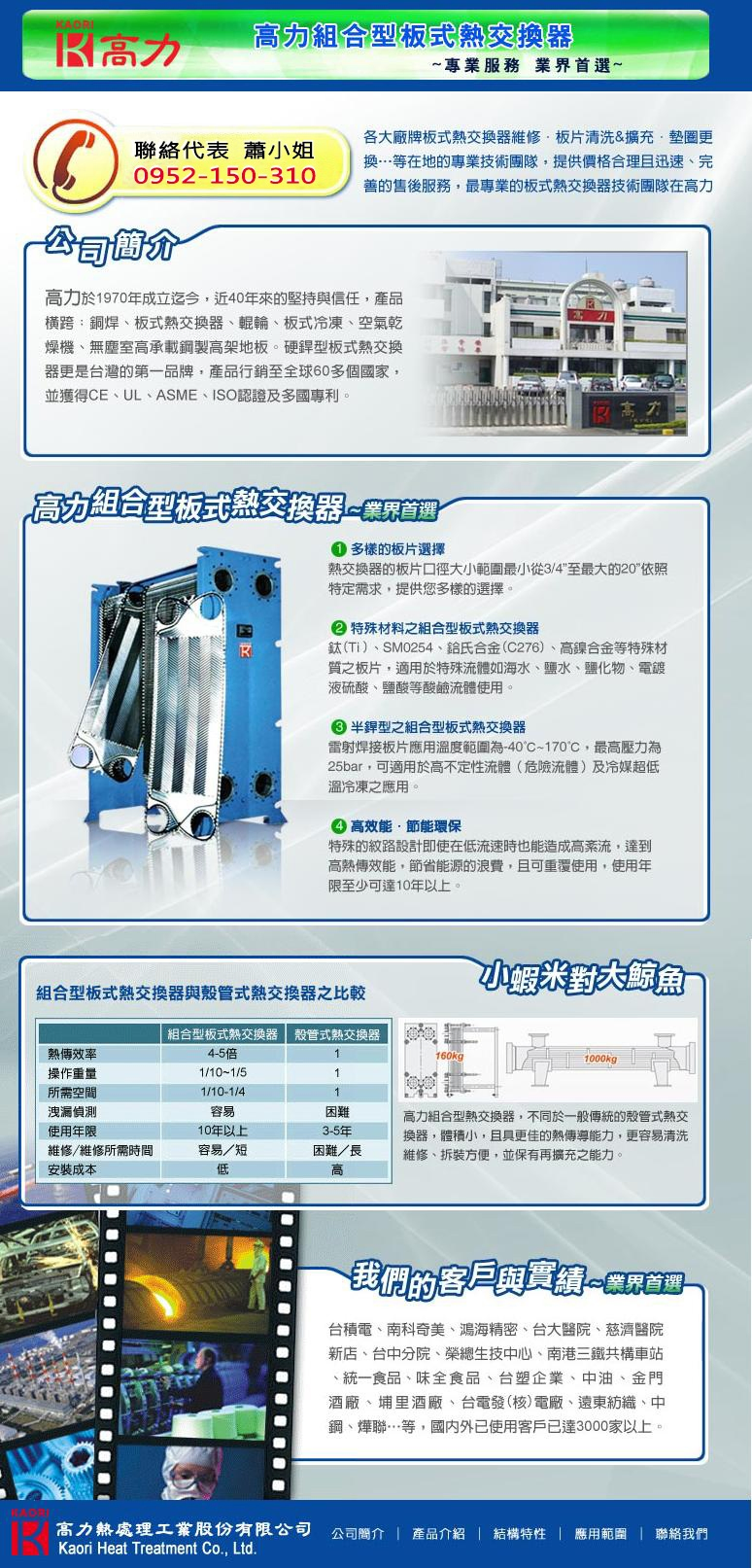Heater & Cooler, your best choice!

Gasket Type Plate Heat Exchanger pressure: 21bar
Plate Material:
StainlessSteel (304,316,316L) , Titanium (Grade 1 95%), Titanium Palladium, Avesta SMO 254, Hastelloy C-276, Nickel,Incoloy
Gasket Material:
NBR (Nitrile-butadiene Rubber)
operating temperature 150°C
EPM, EPDM(Ethylene PropyleneRubber)
operating temperature 160°C
Fluorocarbon (FKM / VITON)
operating temperature 195°C
Kaori was founded in 1970 by a group of metallurgical industry experts. Since Kaori was established, we have pursued the modernization of the heat treating technology as our goal. The JIS (Japan Industry Standard) marking and process certifications from McDonnell Douglas were awarded to Kaori in 1988 and 1994 respectively. Kaori Technology is the no.1 gasket plate heat exchanger in Taiwan, and is already deeply rooted in global.
We welcome any agency, organization, corporation or person to import our products to your country. We will provide the cheapest price to you and we are the biggest heat exchanger manufacturer in Asia.
Nowadays, our products will be more and more competitive with another heat exchanger company. And the whole of processing industry will be complete in Taiwan.
※ Why use a plate heat exchanger?
The advantages of the plate heat exchanger begin with its design.
Plate heat exchangers, or PHEs, deliver greater efficiency, lower
cost, easier cleaning and maintenance, and closer approach
temperatures than any other heat transfer technology.
Compared to spiral and shell and tube heat exchangers, PHEs
of similar capacity also take up little floor space and are easy to
expand. The vertical swing out plates allow one to pack thousands
of square feet of heat transfer area into a small space, while still
allowing room for future growth.
Product Advantages:
1. Greater efficiency
2. Lower Cost
3. Easier cleaning and maintenance
4. Closer approach temperatures than any type heat exchanger or technology
5. Reduced Fouling
6. Compact Size
7. Easy To Inspect and Clean
8. Light Weight
※ Flow arrangements
While hot and cold fluids flow in opposite directions across a
single plate, the flow pattern between plates can be varied.
Plate heat exchanger flow patterns can be single or multi pass.
A single-pass arranqement means each fluid flows in the
same respective direction across all the plates in the unit.
A multi - pass arrangement is designed in such a way that fluids can change their respective flow directions. Single-pass units are suitable for most applications, but very low flow rates or extremely close-approach temperatures may call for the multi pass configuration.
Our partners include:
National Aeronautics and Space Administration (NASA),
Taiwan Power Company,
HON HAI PRECISION IND.CO.,LTD,
TAIWAN SUGAR CORPORATION,
Taiwan Tobacco and Liquor Corp.,
China Steel Corp.,
China Ship-building Corp.,
China Petroleum Corp.,
Chuanen Company,
Tamsui Mackay Memorial Hospital,
Hsindan Tzu Chi Hospital,
Veteran General Hospital and BiologicalTechnology Center,
National Taiwan University Hospital,
Nankang Station of Three Railways,
Changhua Show Chwan Memorial Hospital,
Tainan Historical Museum,
Social Science Building of Academia Sinica,
Formosa Plastics Enterprise,
Allied Material Technology Corp.,
Kinsus Interconnect Technology Corp.,
Toppan Chinghwa Electronics,
UMC,
Honhai Enterprise,
ASE Chungli Factory,
HannStar Yangmei Factory,
Pro MOS Technologies at Central Industrial Park,
Takahashi Inc. at Central Industrial Park,
Mosel Vitelic Ink. At Southern Industrial Park,
Chin Poon Industrial,
Tien Lai Spring Resort,
Taipei Jen-ai Dibao of Hung Sheng Construction,
Nation Taiwan University,
Industrial Technology Research Institute,
Nuclear Energy Research Institute,
Chung-shan Institute of Science and Technology etc.



